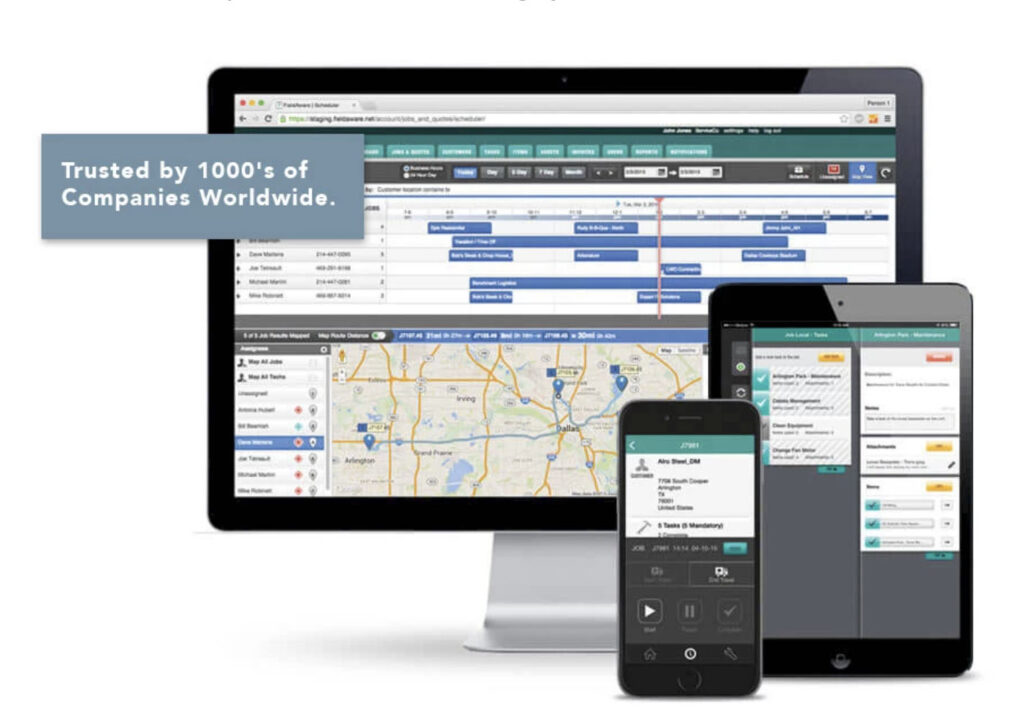Service Strategy: Future-Proof Your Ops With A Field Service Hub
Marc Tatarsky from FieldAware argues the case for a Field Service Hub as part of a field service strategy…
Field service organizations of all shapes and sizes are continually challenging themselves to create new sources of competitive advantage, and a Field Service Hub might be the answer. Through our many years of experience working across numerous industries, we see a direct relationship between the effective use of technology and creating a competitive edge.
Using Technology in a Service Strategy
When service teams actively use technology, it leads to better-served customers. At FieldAware, we measure overall Field Service Maturity across two dimensions – technical maturity and operational maturity. We find time and time again, utilizing an open and integrated service platform is the crucial source in bridging these two critical threads together, enabling organizations to stand out and deliver world-class service.
In a previous article, I discussed the power of extending the service organization’s impact through the integration of back-office systems. Fully integrated service solutions enable organizations to consolidate field-based work from multiple internal and external sources, as well as data from back-office systems into one operational platform. A world-class field service management (FSM) solution provides teams with the core features to address demand management, work planning, technician enablement, work order debriefs, operational management, and analytics & reporting.
But what happens when service departments want to address new/emerging market trends or want access to cutting-edge technologies. Does this mean they have to rip out the old system and find a new one? Or wait until their current all-in-one solution provider develops (or acquires and integrates) a robust ancillary solution themselves?
Enter the concept of a Field Service Hub, fueling an age-old debate of best-of-breed solution vs. all-in-one-platform. In today’s modern cloud infrastructure, coupled with easy integration and intelligent business systems, arguably, the pendulum has swung back in favor of a best-of-breed approach. A Field Service Hub builds on the best-of-breed model, allowing a service organization to gain maximum flexibility and agility. It bolsters a team’s ability to innovate service delivery capabilities without disrupting the integrated “core” system and workflows.
So, what is a Field Service Hub?
A hub is a best-of-breed approach to delivering a robust, highly configurable, open service platform. It offers the “core” capabilities that organizations need to digitize their field service operations and is architected to integrate. Think well-designed – open, integrated, and configurable.
These attributes allow organizations to adopt and access new, modern technologies quickly and future proof their investment. Teams can freely and cost-effectively extend the value of their “core” platform without disrupting the base system and integrations. Service leaders can take on new market advancements such as IoT, AR, advanced communications, dynamic forms, predictive analytics, and other emerging trends to meet changing customer demands.
What can a hub do to create a competitive edge?
A robust hub provides access to a range of complementary best-of-breed solutions that are pre-integrated and offer a seamless end-user interaction. It enables service leaders to implement new technologies and quickly employ field service specific use cases relevant to the technology. Even better yet, it also provides open access to enable customers to integrate their chosen best-of-breed solutions should the vendor not already have one available.
Imagine having your fully integrated service workflow further transformed with an Uberized technician tracking and advanced communication tool that seamlessly leverages details about the work order, the customer, work history, technician, and other “core” system details.
The new enhancement effortlessly improves transparency to the end-customer. Or, switching to a dynamic forms capability that allows you to instantaneously deploy new or revised work protocols or regulatory checklists to all field workers at the touch of a button. Or, deploying a remote diagnostic and training app that allows you to address an aging workforce or new market requirements to work remotely. Many of these capabilities are only partially (if at all) available in the most robust, expensive, and complex all-in-one enterprise solutions. Yet, a hub can affordably provide best-in-class access to these features.
Why is a hub so powerful?
A well-designed hub reduces an end-user organization’s risk of maintaining integrations. Maintenance is the responsibility of the hub provider. Service organizations pick and choose the capabilities they need and gain significant cost savings by only paying for the service provided vs. investing in a comprehensive implementation and stand-alone solution. Furthermore, a hub can be specifically tuned and priced for the mid-market or emerging enterprises, providing access to sophisticated field service capabilities that are easy to implement and deliver rapid ROI.
A service platform, fully integrated to back-office systems, is traditionally viewed to have a minimum shelf-life of 5 to 10-years. However, as we know, now more than ever, markets are volatile. There is constant disruption from technology advancements, new market entrants, globalization, and regulatory changes. Business models must be more dynamic than ever. This required flexibility puts pressure on this investment horizon, especially if a solution is not able to adapt and keep pace with new technology or changing business needs. A Field Service Hub reduces the risk and enables service organizations to continue to gain value from their core FSM investment while swapping and adding satellite applications to facilitate change and adapt to new workflows and business models.
Further Reading:

See FieldAware in action by requesting your demo now.
FieldAware is a top-rated mobile field service management software that lets you easily schedule and dispatch field workers, assign jobs, invoice customers and more.


